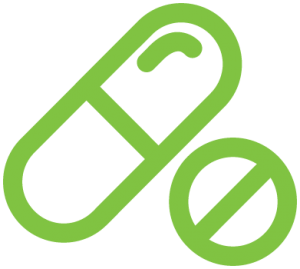Transplant from a living donor
What is life like after living donor transplant?

This timeline can give you a general idea of what happens after transplant surgery. Recovery is a little different for each person, so we can’t know exactly what your experience will be.
1-2 weeks after
Recovery in hospital. Your new kidney may start working right away or it may take a few days. Some patients need a dialysis treatment for a few days to a few months after surgery.
1 month after
Visit the center 2 times a week:
- 1 time for a doctor visit and lab work
- 1 time just for lab work
You may feel up to driving and returning to your normal daily life.
2 months after
Visit once a week for lab work and a doctor visit. You may feel up to driving and returning to your normal daily life.
3-4 months after
Visit every 2 weeks for lab work and once a month for doctor visits. By 3 months, most patients recover fully from the surgery, but some take longer.
6 months after
Visit once a month for lab work and every 3-6 months for doctor visits.
1 year after
Visit every 3-4 months for lab work and about once a year for transplant visits.
After your transplant
Getting a transplant is a treatment, not a cure for kidney disease. A transplanted kidney can do 40-85% of the work of 2 working kidneys. That’s about a half or more.
You may have some medical problems after your surgery, such as:
- Infection – some of the medicines you take after surgery might make it harder for your body to fight infections from viruses and bacteria
- Diabetes
- High blood pressure
Kidney rejection can also happen
Kidney rejection is when your body’s immune system starts attacking your new kidney. This happens when your body knows that the kidney is from someone else and tries to protect itself by attacking the new kidney. If your body rejects your new kidney, the kidney may stop working and you may need to start dialysis.
- 1 out of 10 patients will have rejection symptoms, which may stop with changed medicine
- 3 out of 100 patients will lose their kidney in the first year due to rejection
- 14 out of 100 patients will lose their kidney in the first 5 years due to rejection
If you begin to feel flu-like symptoms including chills, body aches, nausea, cough, fever or shortness of breath, call your transplant coordinator right away. Often, changing your medication regimen can stop your body from rejecting the kidney.
Even after your transplant, you will still need to:
- Take your medicines every day as your doctor tells you
- Visit your doctors regularly for follow ups
- Take care of your health, such as eat healthy foods, limit alcohol, wear sunscreen, and be active each day
- Talk to your doctor before making any changes to what you eat or how you exercise
What medicines will I need to take?

You will need to take some of the medicines you took before your transplant plus some new ones. You will have to take some of these medicines for the rest of your life.
- Take your medicine every day just as your doctor tells you – missing even 1 dose can cause your body to reject the new kidney. If you ever can’t get or take your medicine for any reason, contact your transplant center right away for help. Don’t wait, even for a day.
- Never stop taking your medicines without talking to your doctor. Sometimes, medicines are expensive. If you feel the costs are too much, talk with your doctor and transplant center about how to pay for them. Don’t stop your medicines to save money.
If you have serious side effects or your body starts to reject your new kidney, your doctor may make changes to your medicine to help.
How long will my new kidney work?

Kidneys from living donors usually last about 15-20 years. Some donated kidneys have lasted up to 30 years, and some fail right away. Kidneys from living relatives often last longer than a kidney from someone who has died.
Leaders in transplant excellence
UNOS works with leading educational partners to provide accurate, trustworthy health information. Our educational partners include:
Special thanks to our corporate sponsor for supporting excellence in transplant education:


